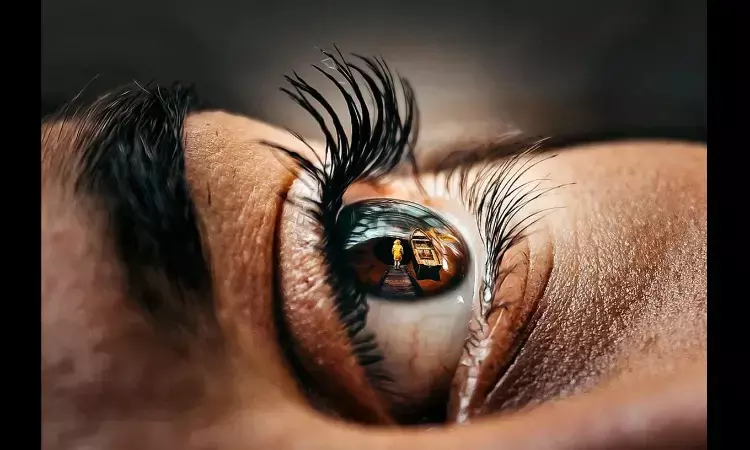- Home
- Medical news & Guidelines
- Anesthesiology
- Cardiology and CTVS
- Critical Care
- Dentistry
- Dermatology
- Diabetes and Endocrinology
- ENT
- Gastroenterology
- Medicine
- Nephrology
- Neurology
- Obstretics-Gynaecology
- Oncology
- Ophthalmology
- Orthopaedics
- Pediatrics-Neonatology
- Psychiatry
- Pulmonology
- Radiology
- Surgery
- Urology
- Laboratory Medicine
- Diet
- Nursing
- Paramedical
- Physiotherapy
- Health news
- Fact Check
- Bone Health Fact Check
- Brain Health Fact Check
- Cancer Related Fact Check
- Child Care Fact Check
- Dental and oral health fact check
- Diabetes and metabolic health fact check
- Diet and Nutrition Fact Check
- Eye and ENT Care Fact Check
- Fitness fact check
- Gut health fact check
- Heart health fact check
- Kidney health fact check
- Medical education fact check
- Men's health fact check
- Respiratory fact check
- Skin and hair care fact check
- Vaccine and Immunization fact check
- Women's health fact check
- AYUSH
- State News
- Andaman and Nicobar Islands
- Andhra Pradesh
- Arunachal Pradesh
- Assam
- Bihar
- Chandigarh
- Chattisgarh
- Dadra and Nagar Haveli
- Daman and Diu
- Delhi
- Goa
- Gujarat
- Haryana
- Himachal Pradesh
- Jammu & Kashmir
- Jharkhand
- Karnataka
- Kerala
- Ladakh
- Lakshadweep
- Madhya Pradesh
- Maharashtra
- Manipur
- Meghalaya
- Mizoram
- Nagaland
- Odisha
- Puducherry
- Punjab
- Rajasthan
- Sikkim
- Tamil Nadu
- Telangana
- Tripura
- Uttar Pradesh
- Uttrakhand
- West Bengal
- Medical Education
- Industry
Initial low dose prednisone effective in immunosuppression in ocular myasthenia gravis

USA: The results of a new retrospective study show that initial therapy for ocular myasthenia gravis with a mean maximum daily prednisone dose of 10 mg seemed to be equally efficacious as a mean maximum daily dose of 29 mg for control at 1 month.
Ocular myasthenia is an autoimmune disorder characterized by double vision or ptosis. It frequently necessitates prednisone medication for immunosuppression, although there have been no prospective studies to assist doctors in determining the optimal dose.
This study was performed by Yesha S. Shah and the team with the objective to check the dose-dependent effect of prednisone on Ocular Myasthenia Gravis. The findings of this study were published in the Journal of Neuro-Ophthalmology, in the month of December 2021.
This was retrospective research that compared myasthenia symptom management at 1 month in individuals treated with a maximum daily equivalent dose of prednisone less than 20 mg (low-dose group) against 20 mg or more (high-dose group) (medium-dose group).
The findings of this study were as follows:
1. There were 39 patients in total: 19 in the low-dosage group with a mean maximum daily dose of 10 mg and 20 in the medium-dose group with a mean maximum daily dose of 29 mg.
2. At one month, the low-dose group was 75% controlled or considerably improved, while the medium-dose group was 74% controlled or greatly improved.
3. The overall seropositivity rate was 64%, with 84% of the antibody-positive group controlled or significantly improved after one month and 57% of the antibody-negative group controlled or significantly improved after one month, and no difference in prednisone dosing between the two groups.
In conclusion, These findings have significant implications for the treatment of ocular myasthenia, particularly considering the severe side effects associated with high-dose steroids. Additional study is needed to provide more supporting data on medication dosage dependency in patients with ocular myasthenia gravis.
Reference:
Shah, Yesha S. BBA, BSA; Henderson, Amanda D. MD; Carey, Andrew R. MD Effect of Initial Prednisone Dosing on Ocular Myasthenia Gravis Control, Journal of Neuro-Ophthalmology: December 2021 - Volume 41 - Issue 4 - p e622-e626 doi:10.1097/WNO.0000000000001058
Medical Dialogues consists of a team of passionate medical/scientific writers, led by doctors and healthcare researchers. Our team efforts to bring you updated and timely news about the important happenings of the medical and healthcare sector. Our editorial team can be reached at editorial@medicaldialogues.in.
Dr Kamal Kant Kohli-MBBS, DTCD- a chest specialist with more than 30 years of practice and a flair for writing clinical articles, Dr Kamal Kant Kohli joined Medical Dialogues as a Chief Editor of Medical News. Besides writing articles, as an editor, he proofreads and verifies all the medical content published on Medical Dialogues including those coming from journals, studies,medical conferences,guidelines etc. Email: drkohli@medicaldialogues.in. Contact no. 011-43720751


